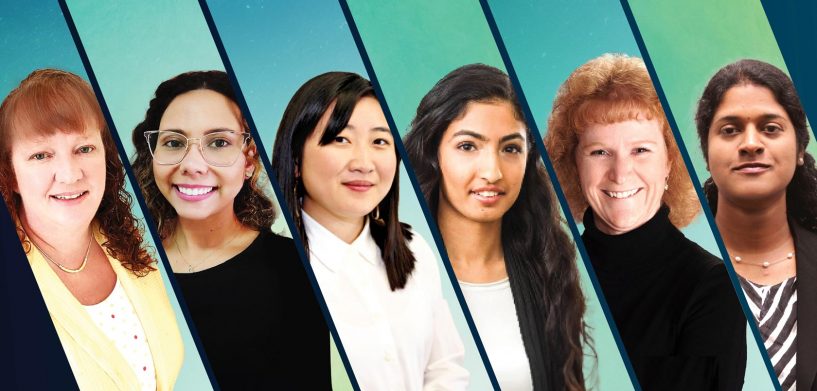At Hexagon, we acknowledge and honour the amazing achievements of women in science, technology, engineering and mathematics (STEM). In this blog series, we share the stories of women at Hexagon who are leading the charge in tech innovation, digitalisation, sustainability and autonomy.
Software is the backbone of digital reality. The world relies on software to enable digitalisation and enhance the world’s autonomy and sustainability capabilities. That reliance means that almost every industry requires ingenious and committed developers and engineers to push technology forward.
In this edition of our Women in Tech series, we will feature some of our employees who are at the forefront of driving software innovation to enable better, more intuitive and more powerful digital products.
Rabia Saeed, Software Engineer, Leica Geosystems, part of Hexagon
Saeed always had a special knack for mathematics and science. Even though she didn’t have a full career plan yet, she enrolled in an engineering university so she could study what she loved. “To me, it was rewarding and inspiring to see how research and development in STEM has a direct impact on the world,” said Saeed.
Since then, she has contributed to research and development projects in many industries, including medical, automotive and now surveying as a software engineer with Hexagon’s Leica Geosystems. “Being part of a team that brings innovative projects like AP20 into the market is a highlight of my career,” she said. “Our projects bring automation to practical life by simplifying tasks, providing convenience and saving time.”
Saeed said having role models for women and girls at an early age is crucial to inspire them toward a STEM career. “Young girls need visibility of women’s achievements that they can look up to. They also need to realise how STEM impacts the world. More special programs in schools would do that well,” she said.
For any woman or young girl interested in STEM, Saeed said, “Focus on your passion. You shouldn’t be afraid of challenges – rather, enjoy them. They open new horizons not just professionally, but on a personal level.”
Haritha Bandarupalli, Smart Reference Data Product Owner (HCCI), Asset Lifecycle Intelligence
Breaking tradition in India, Bandarupalli was the first girl in her family and neighbourhood to move to the United States for higher education. There she enrolled in an engineering master’s program with a full scholarship.
After graduating, she started working in the oil and gas industry in Texas, which she said shaped her personality and leadership skills. “Working in the United States changed my perspective on life, taught me tough lessons, broke all my biases and gave me the guts to dream big,” Bandarupalli said. “From a total introvert as a kid to an extrovert and outspoken person today, I owe so much to my experience in America.”
When she returned to India, she decided to feed her growing interest in tech by pursuing a role at Hexagon. Today she is a core industrial engineer and also a current MBA student at NMIMS, Pune.
Bandarupalli believes strongly in embracing change as a way forward for herself and her teams. “Change is the only constant, and we will continue to encounter it more often than ever,” she said. “The best way to embrace change is to increase awareness and educate yourself and your team until there’s a desire to give the change a chance.”
For women and young girls in STEM, Bandarupalli said, “Don’t be silent at the meeting. Speak up and bring your point forward. Women are multitaskers and great leaders, but the only thing stopping you is you.”
Aimee Ferguson, Director of Solution Design, Asset Lifecycle Intelligence
Ferguson always had an inclination toward math and science, so she knew the engineering path was right for her. After college, she sent resumes to construction companies, transportation departments and engineering firms with no hesitation. “I truly didn’t know these were jobs women typically didn’t apply for,” she said.
No one ever told her she shouldn’t pursue her love of STEM. At eight years old, her grandfather took her to work and showed her how an industrial boiler worked. At fifteen, she acquired a rundown 1962 Austin Healy Sprite and her parents taught her how to rebuild the engine, perform body work and drive a manual transmission. “Not once did I think I couldn’t get that car running because of my gender,” she said.
Ferguson carried that same belief into her first role with the biggest construction firm in the world. “There I was on my first day, wearing steel-toed boots. I was overseeing work by concrete finishers, ironworkers and general laborers. Needless to say, there weren’t a lot of females around to ask how I fit my long hair under my hard hat!”
She believes people become successful at what they love to do when those raising them don’t try to hold them back. “Believe it or not, I found this same acceptance with my supervisors and peers in the construction industry and now the software industry with Hexagon,” she said. “If I choose to learn a new skill, I’m always encouraged to pursue it. I strive to provide similar guidance for my peers, female and male, because it has been instilled in me.”
Ferguson says one of the best ways to remove gender stereotypes and inspire women into tech leadership is to encourage them from the very beginning. “Refrain from telling they can’t or shouldn’t. Most importantly, don’t allow them to believe they can’t.”
Chantal Yang, Senior Software Developer, Asset Lifecycle Intelligence
With multiple degrees in computer science under her belt, Yang began as a software developer with j5 South Africa, part of Hexagon. Today she is a programming powerhouse, having joined various teams while building the core product. She is a senior software developer and Scrum Master on the j5 Product Team and also a member of the Application Security Team in Hexagon’s Asset Lifecycle Intelligence division.
But Yang didn’t always know a career in STEM was right for her. She said she first struggled with her career trajectory. “I didn’t know what I was working towards as I forged my path in the tech industry,” Yang said. “But I found that being open to new challenges and trying out different opportunities – including ones I didn’t think I had the skills for – was a great way to learn, grow and figure out my strengths.” That bravery allowed her to be more intentional as her career progressed.
In high school, Yang was the only female who chose information technology as her final year subject. At university, she was one of 10 women in her honours computer science class of 40. “With numbers like these, it’s not surprising that women usually don’t enter STEM fields. They have a small group of female peers and an even smaller group of women mentors and role models,” Yang said.
Yang believes we should consider why women in STEM leave the industry. “We need to think about how to encourage women to stay. By helping and supporting women to move forward in their careers, they’ll feel more inclined to keep pursuing their passion in STEM.”
Eluany Carvalho, Senior QA Analyst, Hexagon’s Agriculture division
“To be honest, I always dreamed of working in the humanities field,” Carvalho said. Then one day, a friend showed her how computer science enabled design, creativity, learning and processing of information while making the world a better place. “It changed my way of thinking and led to me being here.”
As a Senior QA Analyst with Hexagon’s Agriculture division, Carvalho guarantees all aspects of software functionally and technically, identifying software defects and bugs before they get to the final user. She recommends solutions and improvements to developers after manual and automated testing procedures for web and mobile platform-based software. “Helping customers improve the quality of their products and enhancing product chains for the real world makes me proud of what I’m doing,” she said.
Structuring and managing a QA team that previously didn’t exist improved Carvalho’s long-term growth and career. “It’s gratifying to help beginners understand and show how important manual and automated testing is for reducing work-sprint time,” she said. By getting all involved personnel to work closely, she helps them learn deeper about the final user process.
She said women starting in STEM careers won’t have it easy, especially at first. “It will be challenging and uncertain when you first start working in the field, but it will be so rewarding when you understand that you only needed to believe in yourself,” she said. “Be strong and brave, but know you don’t have to be perfect. And don’t be afraid to ask questions – the important thing is that you are learning, not that you know everything.”
Khris Chess, Executive Director of Software Development, Shared Solution Services, Asset Lifecycle Intelligence
Chess leads Hexagon’s Asset Lifecycle Intelligence division in internal business system development, user assistance, quality systems and various shared services and global projects. With over 29 years of experience in project management, personnel management, technical writing, user experience and business system integration, Chess is a certified Scrum Master and Product Owner.
She started in writing, with a double major in Technical Writing and Creative Writing from Carnegie Mellon University. Since then, her journey has been one of simply stepping through open doors. “I went to work for a startup and ended up becoming a Human Interface Manager at an enterprise healthcare company,” she said. There she learned about user experience design and began learning management skills. At Hexagon, she managed writers and worked in the user interface, then took over JTS when it transitioned from corporate IT back to the product center.
The biggest challenge she had to face, though, was public speaking. When Hexagon’s Asset Lifecycle Intelligence division adopted Scrum, Chess’ manager told her to take public speaking classes. “I was terribly shy,” Chess said. “Once I’d overcome that fear, my manager asked me to take over some training for the Scrum teams.” Chess’ willingness to step up led to more leadership opportunities.
Chess has worked for many women who have shown her that the best leadership combines people relationships with technology. “Our core value is ‘Fearlessness.’ That will take you so far. If an opportunity presents itself, go for it, even if you’re not sure you can do it,” she said. “People will help you, and you will be surprised by what you can learn and do.”
Her advice is to refrain from limiting yourself to traditional boxes. “There are many ways to be successful and valuable in technology and business. I once worked for a woman who founded her own healthcare company. She showed me what it was like to be a compassionate and savvy business leader at the same time.”
Hexagon believes in celebrating diversity. Thank you to all our employees who innovate in tech across the industries and ecosystems we serve.























